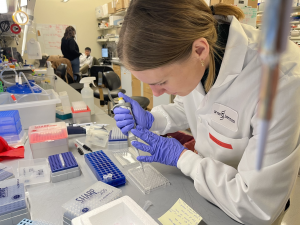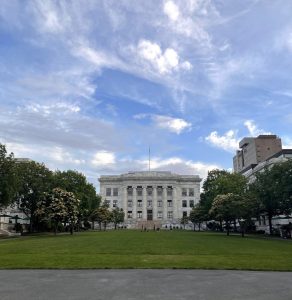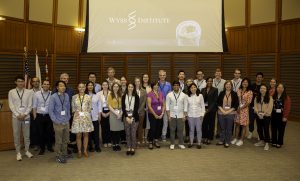“Everything is bigger there, one needs a car to get anywhere, the baseball and football they play are something else, and it is supposedly the college town and biotechnology hub.” This was the rather stereotypical view of Boston I had seen and heard from multiple sources (such as many American movies) before crossing the Atlantic for the first time and landing to one of the oldest cities in the United States. For the next six months, I was going to work as a HiLIFE Visiting Graduate Researcher at the Wyss Institute for Biologically Inspired Engineering at Harvard University.
The Wyss Institute has a strong emphasis on translating bioinspired innovations and research findings into clinical use. The number of patents, licenses and start-ups deriving from the Wyss is astonishing: during the 14 years of the institute’s existence, over 4000 patents have been filed and 56 start-ups founded. To enable this technology translation, Wyss operates through extensive collaboration with industry, government, foundations, and philanthropists. The Wyss teams have experts from different fields ranging from engineering to veterinary medicine, from general medicine to bioinformatics, and from molecular biology to bioethics.
The original six months got extended and therefore, during the past eight months, I got the opportunity to work in Donald Ingber’s (M.D., Ph.D.) lab in the Brain Targeting Program at the Wyss. Of these months, six I was present in Boston and the final two contributing to the program remotely from Finland. The Brain Targeting Program aims at discovering and developing new brain transport shuttles and brain-targeted therapies to more efficiently treat diseases in the central nervous system, such as neurodegenerative diseases and brain tumors. For reading more about the research topic, please have a look at my first blog post. The internship was certainly the most remarkable experience during my Translational Medicine Master’s studies at the University of Helsinki, and I could have not imagined a better way to complete my studies.

What comes to my presumptions about Boston, at least one of them proved very accurate. According to the EPM Scientific (2023), this year, Massachusetts has earned the title of “the largest and leading Biotech hub in the world”. The life science and biopharmaceutical sector has grown massively in the Boston metropolitan area, this growth corresponding to increase in venture capital, employment rate, and governmental funding received. In fact, there are almost 1000 biotech companies, and over 60 colleges and universities in the area! Combine this with specialized medical centers and university teaching hospitals such as Dana-Farber Cancer Institute, Boston Children’s Hospital, Beth Israel Deaconess Medical Center, or Massachusetts General Hospital, and you have the foundation for boundless opportunities.
During my daily bike commute along the Charles River, not only could I enjoy the views of prestigious red brick buildings from the 18th century, but also appreciate the modern glass office buildings with biopharma company names like Biogen, Takeda, Pfizer, or Eli Lilly written on top of them. The different universities, non-profit organizations, venture capital firms and other groups were organizing various incubator and accelerator programs with pitching events open to attend for anyone interested. In addition, there were free of charge conferences, seminars, and lectures given by top scholars of the field, by people you had previously only seen in Ted Talks or had read their state-of-the-art work from Nature, Cell, and Science. You would see advertisements of novel RNA technology in the subway and randomly hear discussion of a given research topic in almost any bar or restaurant in the city. Even if you would go on a walk in a national park hundreds of miles outside Massachusetts, you would encounter other hikers with their company or institute swag, portraying very clearly the amount of biotech and medicine professionals in Boston and Massachusetts area.

For the work of our Brain Targeting Program and my internship this meant that I would be immersed into science, innovation, and biotechnology. Truly feeling like a child in a candy store. It was deeply inspirational and improved my thinking to be more creative yet critical. I could meet like-minded people and create networks with scientists working on topics of my interest. We could also work with clinicians and hospitals from around the corner and foster collaborations with other research groups somewhat effortlessly.
To conclude, I wanted to summarize three main learnings from my internship experience that are not only applicable to Boston but can be utilized in other contexts as well.
1. Keep an open mind
The amount of biotech companies and research initiatives makes it possible for anyone to find their research niche from Boston. There are hundreds and hundreds of job posts on LinkedIn, in positions rarely – if at all – seen back home in Finland. The challenge is not how to find what you would like to do, but how to choose from all the possibilities. That is why especially if you are in your early career, keep your mind, eyes, and options open.
Participate in different events, listen to talks from various specialties from academia and industry, talk to undergrads, PhDs, professors, R&D scientists, COOs, patient representatives… and you never know if you happen to sit next to a company CEO ready to hire a talent. Reflect on what you already know and have experience on, what would you like to learn, what is your aspiration, and get inspired. If you cannot travel to a big biotech center at this moment, see possibilities online or gather information and plan possibilities for a research visit, for example via funded traineeships or short training courses.
2. Networking is key
Sorry, I know you have heard this a million times, but it just is so important… All the opportunities and events you attend will also gather important and interesting people for you to meet. These people can provide you with valuable insights into your research and career or introduce you to other connections. So even if you would not necessarily consider yourself the most outgoing person and have always felt that networking is anxiety provoking and definitely not for you, dare to get in contact with and meet people.
In addition to introducing yourself and engaging into conversations spontaneously in events, you can send emails and meet people in person after you have had some time to think what you would discuss with them. It is not a bad idea either to review the speakers of an event beforehand and formulate questions you would like to ask them. In this way you will feel more confident and importantly, not waste anyone’s time. Even though the art of small talk is very much mastered in the United States, and it is a big part of the culture, people are busy and appreciate using their time well. Yet, avoid thinking of what you have to say is not of importance and because of it cause you not to talk to people. Despite their overbooked schedules, it was amazing to see how top scholars with over 100 000 citations would stop and truly listen to what you had to say, no matter in which career stage you were.
But in all, you will get the most out of these situations when you are clear and concise. Thus, tell honestly who you are, what you would like to do and learn, and ask for advice or even collaboration if you have a potential idea. You can also create a short pitch for yourself, it will help you to focus. And remember to be gentle with yourself, practice makes perfect.

3. Have fun and explore outside the hub
Even though Boston, or any place you work and study, is such an exciting place considering your career, do not just biotech and network 24/7 – even if conversations with your friends would every now and then slip to the lab experiments and recently approved therapeutics. It is good to take some distance from constantly thinking about career and go explore the city and its surroundings. Go to the nature, delve deep into the history, visit art museums, join block parties, and enjoy the culinary scene. This will give you a full internship experience which should not be just fun science but fun experiences overall!
The HiLIFE Research Trainee Scholarship gives you a unique possibility to work and contribute to science nearly anywhere in the world and with a vast amount of life science topics. The opportunities for you to go after your dreams are out there. What will be your path?
Reference
EPM Scientific. (2023). Boston is Now the Largest Biotech Hub in the World. https://www.epmscientific.com/blog/2023/02/boston-is-now-the-largest-biotech-hub.
